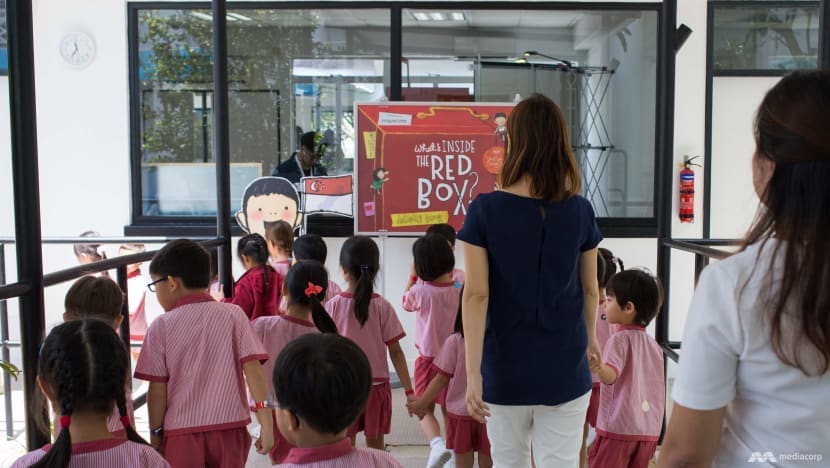
A preschool teacher with children. (File photo: TODAY)
Currently, the NIEC and three other training providers are already offering courses with the new scenarios to teachers in the industry and new entrants.

A preschool teacher with children. (File photo: TODAY)
SINGAPORE: Preschool teachers will get clearer guidelines on what they are allowed and not allowed to do in the classroom as part of changes to their training programme.
This includes specifics on what constitutes striking a child and how to manage emotions in the classroom.
The improvements come following a review by the Early Childhood Development Agency (ECDA), said Minister of State for Social and Family Development Sun Xueling on Tuesday (Oct 17).
“ECDA has been reviewing the curriculum and enhancing the curriculum to have even more explicit scenarios listed in the curriculum about what are the dos and don'ts. This review has been completed,” she said during a visit to the National Institute of Early Childhood Development (NIEC) City Campus in Bras Basah.
Currently, the NIEC and three other training providers are already offering courses with the new scenarios to teachers in the industry and new entrants.
“We recognise that we have to put in more scenarios into our classroom management methods so that preschool teachers know when (they) have a challenging situation, how they should manage their own emotions, as well as how they should interact with children, recognising all the time that children are individuals that we must respect and interact with positively,” said Ms Sun.
The changes come amid cases of preschool teachers mistreating their charges and the hope is for all training providers to update their curriculum by year-end.
Educators may enter the sector with their own cultural practices and experiences growing up, she added.
“We may think that certain actions that we are used to may be good for the child. But in today’s day and age, when we look at what are positive classroom management methods, we have to ensure that our educators are all on the same page as to what are the dos and don’ts when it comes to managing children,” she said.
For instance, striking does not only extend to using hands to hit a child, she said. Using items like rulers and books also constitutes striking a child.
Another scenario the guidelines address is what it means to isolate a child.
When a child is having a tantrum, the teacher can place him in a calm corner, but still watch over the child to ensure that no safety issues arise.
“These are examples whereby we’re being very explicit in the actions over and above what is currently in the code of practice, so that there is no doubt in the educators’ minds about how they have to ensure child safety in our preschools,” said Ms Sun.
The current curriculum ensures that teachers are equipped with necessary skills to manage children according to their developmental stages, said Ms Suraya Saidon, programme head of faculty management and senior lecturer at NIEC City Campus.
“To do that, we keep a lot of case studies, and we do a lot of roleplay,” she said. There are gaps that can be fixed, like providing “a lot more specific examples”, so that students can relate better, she added.
For instance, they may not understand what it means not to manage children positively.
“They may think ‘I do just what I do, as I normally would in a classroom, so I thought that should be okay. But what do you mean by managing children in a positive way?’” she said.
Moving forward, more in-depth scenarios that teachers can relate to can be expected, she added.
“This is something that we really need to expand and make more current and more practice-oriented, so that when they go back to their centers, they can actually replicate the same thing,” she said.
“While we can do all these things in the training institute, we also need support from our partners. Something needs to be done on the ground to monitor what has been going on in the classroom.”
She added that this can be in the form of peer support, mentoring, and honest conversation with the teachers, acknowledging that educating young children is not an easy job.
While such clearer guidelines will help educators, some believe more changes are needed.
Mr Justin Heng, an NIEC student who is taking his diploma (conversion) in early childhood care and education, said that his course is rigorous, but that it lacks one topic – mental health.
“It will be nice to have maybe a module catered to teachers' well being in future because I think teachers’ mental health and well being is quite an important issue as well, with the recent cases of child mismanagement,” he said.